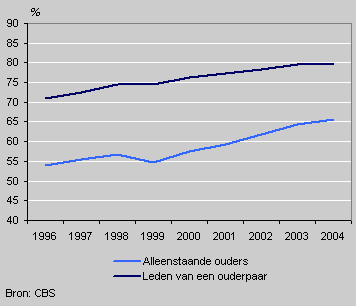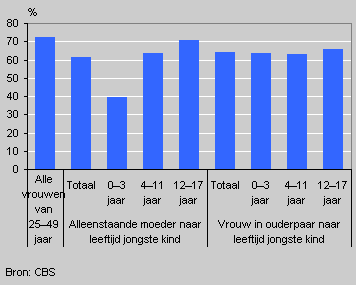More single parents working

Labour participation of single parents has increased substantially since 1996. Single mothers with children at secondary school in particular relatively often have a job. Working mothers with young children relatively often want to work shorter hours.
Participation of single parents up sharply
Labour participation by single parents has risen strongly since 1996. In 2004 65 percent of single parents belonged to the labour force. In 1996 this was still only 54 percent. The number of single parents with underage children rose from 208 thousand in 1996 to 270 thousand in 2004. Nearly nine out of ten them are women.
Gross labour participation of parents, 1996-2004

Parents living together also more often have a job, but here the increase is much smaller. Nearly 80 percent of parents in couples were in the labour force in 2004. Labour participation of mothers who are married or living together was around the same level as that of single parents, at 67 percent.
Mothers less likely to work than other women
Labour participation of women with children is lower than for all women aged 25-49 years. The only exception is single mothers with children at secondary school, who are just as active on the labour market.
Gross labour participation of women with underage children, 2002/2004

Working mothers less satisfied with working hours
Most working fathers are satisfied with the hours they work. Fewer mothers are satisfied. Mothers of young children ((0-3 years) relatively often indicate that they would like to work for fewer hours. As the children grow older, mothers want to work more hours. This wish is stronger for single mothers than for those with a partner.
Women with underage children who want shorter/longer working hours, 2002/2004

More unemployment among single mothers
Single mothers are relatively often unemployed. Nearly 12 percent of single mothers are looking for a job of at least twelve hours a week. They are twice as likely to be unemployed as mothers with a partner.
Ingrid Beckers